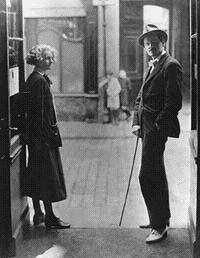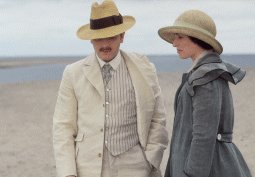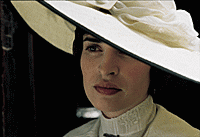
|
The James Joyce Society, usually at The Gotham Book Mart 41 W. 47 Street New York City -- but sometimes about town or elsewhere!
F U T U R E 2 0 0 3 E V E N T S :
Michael F. Capobianco Thursday, 30 October 2003, 6:00 pm
R E C E N T 2 0 0 3 E V E N T S :
P A S T E V E N T S and M E E T I N G S
Mabou Mines presents
CARA LUCIA The WORLD PREMIERE will take place at the HERE Arts Center (145 Sixth Avenue) with previews starting April 15, 2003 and opening Wednesday, April 23, 2003 at 8:30 PM. CARA LUCIA, Mabou Mines newest work, centers on the life and death of James Joyce's only daughter Lucia. As a young woman in Paris during the 1920's she danced, painted illuminated letters for her father's books, and fell in love with Samuel Beckett and Alexander Calder. By 1932, however, Lucia's behavior had become strange and erratic. She eventually found herself in a mental hospital where she would live for the next forty-seven years. James Joyce believed she was the natural inheritor of his genius. As a theatrical ode, CARA LUCIA navigates Lucia's final journey through her imagined afterlife facing her tumultuous past and her legacy as a literary reflection in her father's final work Finnegans Wake. Sharon Fogarty, the Director and co-writer of CARA LUCIA, has been the co-artistic director of Mabou Mines since 1999. Prior to her post with Mabou Mines, she served as artistic director of New York City-based Daedalus Theater Company from 1997-1999. Sharon has produced many of Mabou Mines' productions over the past five years including tours of the company to Russia, Korea and Brazil. CARA LUCIA stars four-time OBIE winner Ruth Maleczech (founding member and co-artistic director of Mabou Mines) as Old Lucia, Rosemary Fine and Clove Galilee as Young Lucia. OBIE award-winning Julie Archer is credited with the production design. Jim Clayburgh will design the set and lighting. The choreography will be by J'aime Morrison with original music composed by Carter Burwell (Gods and Monster, Velvet Goldmine, all of Spike Jones' and Cohen brother's films.) Performance Schedule: April 15 - May 11: Tuesday - Saturday at 8:30 PM and Sundays at 4 PM at the HERE Arts Center (145 Sixth Ave. between Spring and Broome). All Tickets are $25.00. Tickets will be available from TicketWeb or by calling the HERE box office at 212.647.0202. Mabou Mines is a collaborative theater company founded in 1970 and based in NYC. Alone from all American acting ensembles, Mabou Mines bridged the gap between theater and art, taking as its first principle the idea that life is performance - that the study and practice of one is the study and practice of the other. SPECIAL ANNOUNCEMENT: Myra Russel presents a new talk introducing Renowned tenor Robert White and pianist Stephen Gosling in The Chamber Music poems of James Joyce: A New Look at Settings by Many Composers Lincoln Center Music Library Auditorium New York City (Old date Thurs, Dec. 5, 2002, 6 pm, cancelled/snow) NEW DATE: 6 P.M on THURSDAY, MARCH 20, 2003 Admission: free. Entrance: Front: Music Library between Opera House & Theatre Or rear: from Amsterdam Ave., south of W. 65th Street MICHAEL J. O'SHEA: "Le Petomane, Elvis and Other Unexpected Guests at Joyce's Wake" Wednesday, 5 February 2003 at 6:00 pm Michael J. O'Shea, Ph. D. is Visiting Professor of English at Drexel University He is the editor of Studies in Short Fiction and is a Trustee of the International James Joyce Foundation Friday, November 22, 2002, 6 p.m. Cóilín Owens George Mason UIniversity "The Odour of Corruption: A Theological Reading of 'The Sisters'" he death of his intellectual and spiritual mentor provokes a crisis of faith in the boy-narrator. The language and structure of the story reveal its Gnostic premises. The priest is a pneumatic, his sisters hylics. Its conclusion: the psychic boy becomes agnostic. When Joyce wrote to Grant Richards that "people might be willing to pay for the special odour of corruption which, I hope, floats over my stories" (Oct 15, 1905), he was not making reference either to Dublin’s garbage or political chicanery. Rather, he was coining a phrase drawn from the theological lexicon of his time ("the odour of sanctity" and "the corruption of the flesh"), by which he indicated his purpose was to reveal the phenomena of original sin. For all the critical attention these stories have received, these implications have been largely ignored, especially in recent readings of Dubliners. Read in the light of the Christian understanding of grace shaped by the language of Saints Paul and Augustine--"The Sisters" presents us with a priest who has fallen into Quietism, a latter-day version of Gnosticism, the first major heresy in the history of the Church. A close examination of the text of "The Sisters" shows it to be structurally and thematically informed by the idea of knowledge proposed by the Gnostics, a notion that divided humanity into three parties: the pneumatics, the psychics, and the hylics: those who lived by the spirit, the rational mind, and the flesh, respectively. The boy’s fascination with the terms simony, gnomon, and paralysis in the opening paragraph implies these correspondences, and the body of the story develops their implications. These terms correspond, in turn, with the three procedures by which the narrator attempts to comprehend the physical death of his spiritual and intellectual mentor: through dreams, rational analysis, face to face, and finally through silent mediation. The issues in the story are therefore the relationships between soul, mind, and body, and the modes of knowledge appropriate to each. By comparing his memories and fantasies about Fr Flynn with the overheard conversations between his relicts, the boy moves from a fascination with the Christian promise of eternal perfection, to a radical skepticism about all forms of human knowing. As a disciple of Fr Flynn, therefore, he moves from a fascination with latter-day Gnosticism to modern agnosticism. This reading helps us to gloss an epiphany that Joyce reported to Stanislaus from Trieste: "While I was attending the Greek mass here last Sunday, it seemed to me that my story ‘The Sisters’ was rather remarkable" (February 28, 1905). The development of the implications of this reading of "The Sisters" for the general design of Dubliners and Portrait is the subject of a book in progress. Cóilín Owens was born in Ireland. Educated by his parents, the Cistercian monks at Roscrea, Notre Dame and University College, Dublin, he studied Joyce with Bernard Benstock at Kent State. He has been teaching at George Mason since 1976, and has published widely on Irish drama, literature, and language. Among his publications are Family Chronicles: Maria Edgeworth’s Castle Rackrent (1987), Irish Drama 1900-1990 (1990), and Irish/Gaeilge (1994), and numerous essays on Joyce that have appeared in Eire-Ireland, The James Joyce Quarterly, and The Irish University Review. A longtime member of the James Joyce Foundation, he has been an officer on the national committee of the American Conference for Irish Studies. Over the past 25 years he has been active in the affairs of the Irish American Cultural Institute and the Gaelic League in the Washington area. He lives in Mount Vernon, Virginia, with his wife, Julianne Mahler, and sons Seamus and Conor.
Friday, 25 October, 6:00 pm
"The New Joyce Manuscripts at the National Library of Ireland," or "25 New Joyce Manuscripts! Hear All About It: A Report for Non-Specialists" In May 2002 the National Library of Ireland announced that it had purchased 25 previously unknown Joyce manuscripts for about $12 million (US). These documents, a couple of early notebooks, some typescript and proof pages for Finnegans Wake, but mostly early notes and drafts for Ulysses, which will greatly enrich our knowledge of Joyce's creation of his works. Michael Groden, who examined the papers for the National Library as it was considering purchasing the collection, will talk about the manuscripts and their significance. Michael Groden is Professor of English, University of Western Ontario. He is also instructor of an annual course, "Reading Ulysses" each spring at the 92nd Street Y. In addition, he did manuscript work on Joyce: "Ulysses" in Progress" (1977), general editor of The James Joyce Archive and editor of the 16 Ulysses volumes (1977-79). He was consultant to the National Library of Ireland on its purchase of these newly discovered Joyce manuscripts, and currently he is co-editor of Digital "Ulysses": Ulysses in Dublin | Dublin in Ulysses 1904-2004: An Annotated Hypertext and Manuscript Archive: "
His web pages are http://publish.uwo.ca/~mgroden/ and
http://publish.uwo.ca/~mgroden/ulysses/.
Friday, October 4, 6:00 pm
Chris Lombardi, "Notes from a blue:season: A novelist falls in love with Lucia Joyce." "Diaphanous L & Bab working at c&d." A journey in researching and writing a narrative of Joyce's daughter -- from Ellmann's biography to immersion in Lucia's hospital journals to squinting at the Buffalo notebooks to volunteering at a psychiatric hospital. Chris Lombardi studied Joyce with Suzette Henke and Barry Wallenstein. She writes for the "Village Voice," "The Nation," "Women's Enews," and "American Book Review." Her novel "The Suicide Project" was a finalist for Barbara Kingsolver's Bellwether Prize. She is currently working on a novel based on the life of Jehanne Darc (Joan of Arc).
Tues., 11 June 2002, 5:30 pm
Tues. 20 August 2002 (6:00 pm)
Fri., 3 May 2002, 6:00 pm
Fri., 12 Apr. 2002, 7:30 pm:
Heyward Ehrlich
Zack Bowen
and
World Bloomsday Calendar 2002: | |||||||||||||||||||||||||||||||
At The Gotham Book Mart
41 West 47th Street
New York, NY 10036

 The joycesociety.org pages are formatted for Internet Explorer,
The joycesociety.org pages are formatted for Internet Explorer,
Netscape, Opera and similar Windows and Macintosh browsers.
For wireless/handheld/accessibility devices and printing, use .
For hints on optimizing viewing and printing, see help.
 Heyward Ehrlich,
.
Heyward Ehrlich,
.
Site created 02/02/02, last updated 4 May 2002 (Ver. 1.56).
© 2002 The James Joyce Society.




